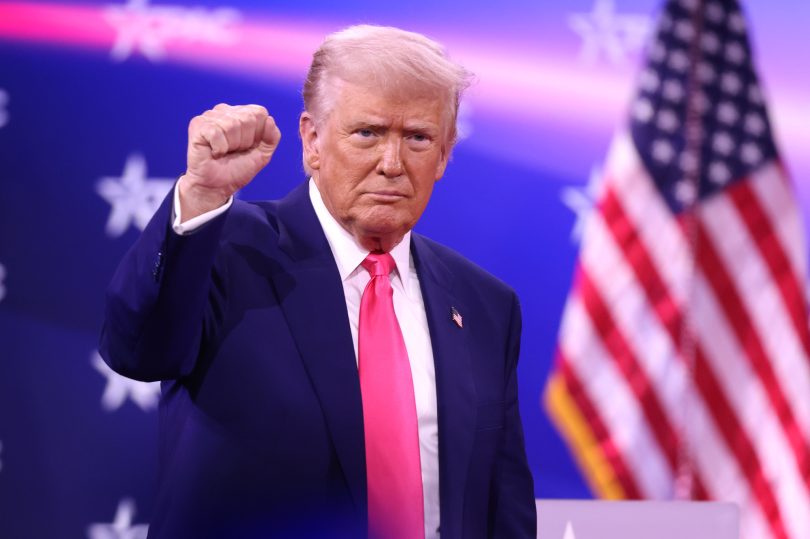As the 2026 FIFA World Cup approaches, bringing millions of international fans to the United States, a controversial new policy from President Donald Trump’s administration is drawing sharp criticism. Starting in early 2026, foreign tourists entering the U.S., including those attending World Cup matches, will be required to pay a US$250 entry fee as part of a broader overhaul of immigration and border policies.
The fee, described by Trump officials as a “national security and infrastructure surcharge,” is being framed as a way to fund increased border enforcement, airport staffing, and enhancements to customs systems. But critics are calling it a “tourist tax” and warning that it could dampen enthusiasm for travel to the U.S. particularly during a global sporting event expected to draw record-breaking attendance.
A measure that will highly impact the World Cup
The 2026 FIFA World Cup will be co-hosted by the U.S., Mexico and Canada, with the majority of matches, including the final, taking place in American cities. Tourism authorities had hoped the event would showcase the U.S. as a welcoming destination, but the new fee could send the opposite message.
“This move threatens to turn the World Cup into a luxury event, accessible only for the wealthiest fans. For many, especially from countries with weak currencies, a US$250 fee on top of airfare, accommodation, and game tickets is prohibitive,” said David Ortiz, a Latin American travel policy analyst based in Washington. In contrast, Trump’s supporters argue the policy simply puts the U.S. in line with countries that already charge entry fees or visa processing costs.
The U.S. Travel Association (USTA) has also weighed in on the issue. Its president, Geoff Freeman, was blunt in a statement to Forbes, “raising fees on lawful international visitors is essentially a self-imposed tariff on one of our country’s largest exports–international travel spending.”
As things stand, what was expected to be a global soccer celebration, with packed stadiums, sold-out hotels, and billions in revenue, could end up being an own goal for the United States.
The outlook on the eve of the World Cup is far from optimistic, and the stakes couldn’t be higher. This is an unprecedented event: 48 national teams, more matches than ever before, and a massive economic projection. FIFA estimates the tournament will generate US$30.5 billion in economic output for the United States.
Cities like Philadelphia and Kansas City, for example, have already projected their expected influx of visitors. Philadelphia anticipated welcoming 500,000 tourist and expects an economic impact of US$770 million. Kansas City, which will host four matches, is projecting US$653 million in direct revenue. Unfortunately, there are growing concerns that these ambitious projections may fall short due to the new entry fee imposed on tourists by President Donald trump, a fee that many coincide, is just one part of Trump’s broader attempt to reassert control over immigration and border protocols.
A diplomatic backlash?
The fee could also strain diplomatic relations, particularly with Latin American and African nations, whose fans are expected to travel in large numbers to support their teams.
Tourism groups and airline associations are lobbying for exemptions or adjustments. “This policy is economically short-sighted. The World Cup is a once-in-a-generation opportunity to stimulate our tourism economy. Why put barriers?,” said Karen Holmes, spokesperson for the U.S. Travel Association.
Adding to the concern, the Trump administration is reportedly considering expanding its travel ban, currently applied to 12 countries, to include more than 40 nations. This potential move has alarmed World Cup organizers and local officials, many of whom were counting on international visitors to make up at least half of total attendance. In short, the prospect of broader travel restrictions, combined with the US$250 fee, is casting a shadow over what was supposed to be a historic and inclusive global event.
The outlook for foreigners and immigrants during the Trump era is growing increasingly uncertain. International media headlines are now dominated by reports of aggressive often arbitrary ICE raids, heightened border and immigration controls, and a climate in which many foreign nationals feel targeted. Visitors and immigrants alike are facing what many describe as disproportionate searches, a spike in visa denials, and now, new restrictions and barriers that threaten to discourage tourism just as the U.S. prepares to host one of the world’s most anticipated events, the FIFA World Cup.
So, what exactly is Trump aiming for? It’s a question many are asking, because it’s hard to imagine a thriving nation turning its back on the very communities that have long been central to its success. The United States’ history is deeply intertwined with the contributions of immigrants and international visitors. From culture and innovation to business and sports, the foreign-born population has helped shape the country into what it is today. Alienating those communities, particularly during a moment of global attention and opportunity, could come at a steep economic and moral cost.










